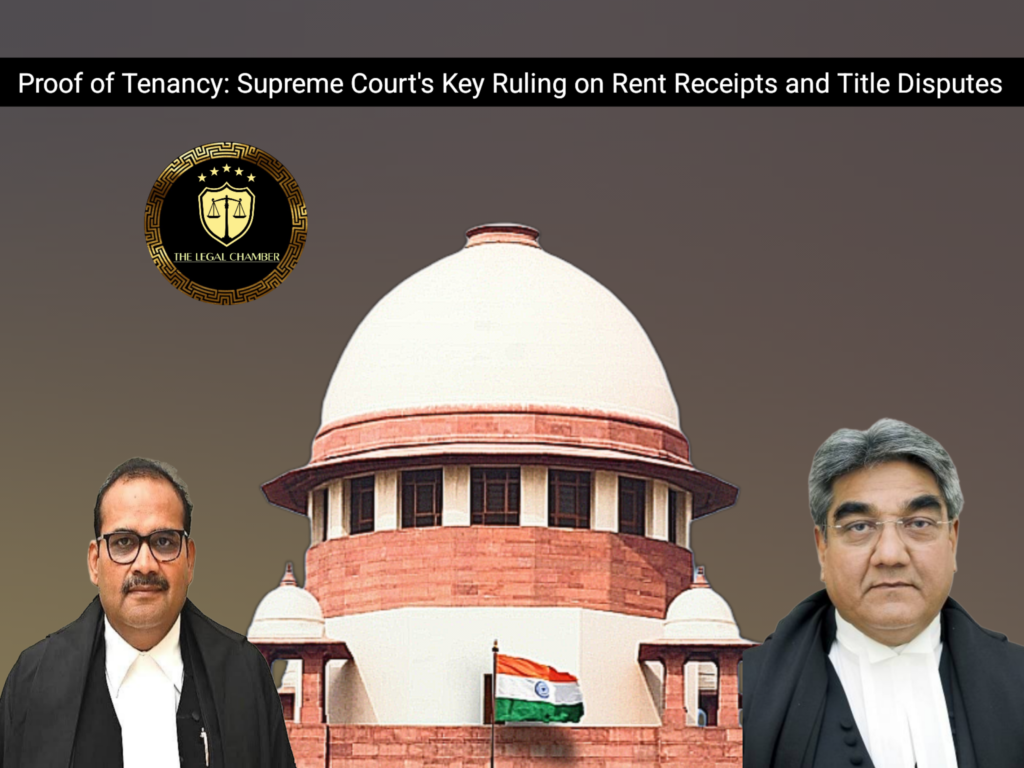
The Supreme Court held that In disputes over landlord-tenant relationships, the Supreme Court clarified that under the Karnataka Rent Act, 1999, the production of rent receipts signed by the landlord constitutes prima facie evidence of the jural relationship. Once this initial burden is discharged, the Rent Controller is justified in proceeding with the eviction case without delving into title disputes, which are beyond its scope.
Facts Of The Case:
The appellant, H.S. Puttashankara, filed an eviction petition against the respondent, Yashodamma, under the Karnataka Rent Act, 1999, concerning a property in Bengaluru. The appellant claimed to be the landlord, asserting that the property originally belonged to his great-grandfather and devolved to him through a release deed from other legal heirs. He argued that Yashodamma was a tenant, having inherited the tenancy from her mother, Mysore Lingamma, who had previously admitted to a landlord-tenant relationship with the appellant’s father in earlier proceedings. The respondent contested the eviction, denying the jural relationship entirely. She claimed the property belonged to the Ankalappa Mutt, that she was a tenant under the Mutt, and challenged the appellant’s title and lineage from the original owner. The Rent Controller accepted the appellant’s rent receipts as prima facie evidence of the relationship and ordered eviction. However, the High Court, in revision, set aside this order, emphasizing that the appellant failed to prove his lineage and ownership, and was swayed by the respondent’s son denying his signatures on the rent receipts. The Supreme Court ultimately found the High Court’s approach erroneous, leading to the present appeal.
Procedural History:
The eviction proceedings were initiated by the appellant-landlord before the Rent Controller (Court of Small Causes, Bangalore) under the Karnataka Rent Act, 1999. The Rent Controller, after examining the evidence which included rent receipts, concluded that a landlord-tenant relationship was established and ordered the respondent-tenant to vacate the premises. Aggrieved by this, the respondent filed a revision petition before the High Court of Karnataka. The High Court, in its impugned order, allowed the revision and set aside the Rent Controller’s eviction order, primarily on the grounds that the appellant failed to prove his lineage and ownership, casting doubt on the landlord-tenant relationship. This led the appellant to file a Special Leave Petition (SLP) in the Supreme Court, which granted leave and culminated in the present civil appeal, wherein the Supreme Court reversed the High Court’s decision and restored the order of the Rent Controller.
READ ALSO:Verified Claim is Key: Supreme Court Distinguishes Between Timely and Belated Homebuyers in Insolvency
Court Observation:
The Supreme Court observed that the High Court erred in its revisional jurisdiction by conducting a fact-finding exercise and setting aside the Rent Controller’s order. It emphasized that under Section 43 of the Karnataka Rent Act, 1999, the production of rent receipts signed by the landlord serves as prima facie evidence of a landlord-tenant relationship. Once this initial burden is discharged, the Rent Controller is legally empowered to proceed with the eviction case. The Court clarified that the Rent Controller’s domain is not to adjudicate complex title disputes; it is only when no such receipts are produced or their genuineness is legitimately suspected that the matter must be referred to a civil court. By dismissing the rent receipts based on a denial of signature and demanding proof of lineage and ownership, the High Court misdirected itself and misapplied the statutory mandate of Section 43.
Final Decision & Judgement:
The Supreme Court allowed the appeal, set aside the impugned judgment of the High Court, and consequently restored the eviction order passed by the Rent Controller. The Court held that the appellant-landlord had successfully discharged his initial burden under Section 43 of the Karnataka Rent Act by producing rent receipts, which constituted prima facie evidence of the landlord-tenant relationship. The High Court was found to have exceeded its revisional jurisdiction by delving into title and lineage, which was not required once the statutory condition of producing rent receipts was met. As a result, the respondent-tenant was directed to vacate the suit property as per the original order of the Rent Controller.
Case Details:
Case Title: H.S. Puttashankara vs Yashodamma Citation: (Arising out of SLP (C) No. 15565 of 2021) Criminal/Civil Appeal No.: Civil Appeal Date of Judgement: September 09, 2025 Judges/Justice Name: Justice J.K. Maheshwari and Justice Vijay Bishnoi
Download The Judgement Here